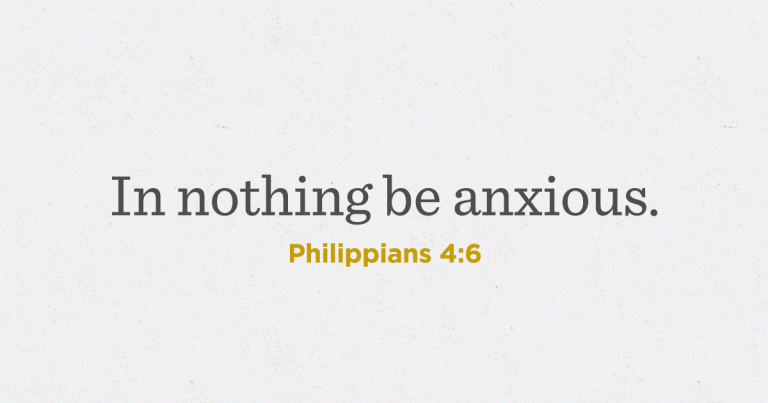How to Deal with Anxiety as Christians

In Philippians 4:6, we’re given a seemingly impossible command:
‘In nothing be anxious.’
Each of us has a long list of anxiety-inducing circumstances — relationship issues, financial woes, naughty children, pressure at work, no work, and so on. And in addition to our personal life, the world today seems to manufacture large-scale anxiety-inducing events — economic uncertainty, war, social upheaval — delivered to us on a conveyor belt of 24-hour news coverage. Is God’s command outdated or unreasonable, given so many difficulties?
God’s Word never changes
God’s Word is unchanging, and its truth stands, uninfluenced by circumstances and changing times. So as believers, we have to take this command seriously. But how can we obey such a command? How is it possible not to be anxious in anything?
We need to look at what precedes this command and what follows it. One principle of studying the Bible is to never isolate a verse and interpret it on its own. Context is important. What precedes ‘In nothing be anxious’ is Philippians 4:5, one of the most comforting assurances in the entire Bible:
‘The Lord is near.’
This fact applies to the Lord’s coming back, certainly, but it also applies to His presence with us today. He is near to us right now. In fact, He is as near as can be. He is within us, in our human spirit.
It’s impossible to be anxious in nothing under our own power. God knows this and has no expectation for us to carry out this command by ourselves. ‘The Lord is near’ proves that with the Lord’s demand comes His supply to meet that demand.
Our tendency, however, is to focus on the demand rather than the supply. We read, ‘In nothing be anxious,’ and we get anxious trying not to be anxious. Instead, we should focus on the supply afforded to us by the Lord to meet His demand, which is His very presence. On our own, we see the command as unreasonable, but when we recognise the Lord’s presence with us, it’s our anxiety that becomes unreasonable, since He is near and ready to help us. If we realise the Lord’s nearness, we’ll also realise there’s no need for us to be troubled.
Fellowship with God
So preceding the command, we have the word telling us that the Lord is near and ready to help us. But what about our list of burdens that cause us to be anxious? How do we transfer these cares to Him? We have to see that what follows the command in Philippians 4:6 is the way to carry out that command:
‘In nothing be anxious, but in everything, by prayer and petition with thanksgiving, let your requests be made known to God.’
This verse tells us that in everything—in every matter, every circumstance, every situation—we can pray and petition with thanksgiving, and let our requests be made known to God.
The notes in the New Testament Recovery Version are helpful in applying this verse:
Note on prayer: ‘Prayer is general, having worship and fellowship as its essence; petition is special, being for particular needs.’
Note on thanksgiving: ‘Both our prayer and our petition should be accompanied by our giving thanks to the Lord.’
The Lord is near, and by prayer and petition with thanksgiving, we can simply tell Him what we’re going through. We can let Him know our needs and specific requests and be saved from our cares. With the Lord nearby, there’s no need for us to carry our burdens by ourselves.
Watchman Nee, a Bible teacher and author, once used the illustration of three construction workers passing bricks up some stairs. One man passes bricks from the first level up to the next, and the second man passes them from his level up to the next. All goes smoothly as long as the bricks keep moving. But if the second man stops passing his bricks along, he’ll soon be crushed by the increasing weight of the load.
We’re often in this second man’s position. All day long we receive cares, troubles, and burdens. And when we hold on to them, we’re soon overwhelmed by the weight of anxiety. What should we do? As soon as we receive the cares and feel threatened under their weight, we must pass them on to a higher level. We can simply turn to the Lord in prayer at any time in the day to let Him know what we’re going through, and He’ll receive our burdens. What a wonderful provision! How thankful we should be!
The promise
We can obey the command in verse 6 — ‘In nothing be anxious’ — by fulfilling the conditions in verse 6 — ‘In everything, by prayer and petition with thanksgiving, let your requests be made known to God.’
The result of such prayer is that we enjoy the promise of peace presented in the next verse, Philippians 4:7.
‘And the peace of God, which surpasses every man’s understanding, will guard your hearts and your thoughts in Christ Jesus.’
The notes in the New Testament Recovery Version help us see how this peace becomes ours and how it guards us from anxiety:
Note on peace: ‘The result of practising fellowship with God in prayer is that we enjoy the peace of God. The peace of God is actually God as peace (v. 9) infused into us through our fellowship with Him by prayer, as the counterpoise to troubles and the antidote to anxiety (John 16:33).’
Note on guard: ‘Or, mount guard over. The God of peace patrols before our hearts and thoughts in Christ, keeping us calm and tranquil.’
As we bring our concerns and burdens to God in prayer with petition, we enjoy fellowship with God. The result of such communing with God is that the peace of God is imparted into us, quieting all our anxiety. His peace even patrols over us, standing like a guard before our hearts and thoughts, keeping us from anything that might disturb our calm in Him.
The Lord’s command is clear: In nothing be anxious. And His word and promise are also clear: The Lord is near, and by making our requests known to God through prayer and petition, the peace of God will guard your hearts and thoughts in Christ Jesus. Remembering His nearness, we can fellowship with the Lord in prayer, giving Him all our cares. When we do this, we fulfil His command spontaneously by enjoying His promised peace infused into us through our prayer.

